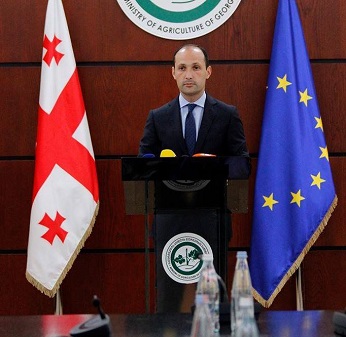Georgian winegrowers look forward to Georgia-China FTA
By Mike Peters (chinadaily.com.cn) Updated: 2016-09-21 14:25
 |
|
Levan Davitashvili, Georgia's agriculture minister, delivered a speech at the press briefing with media representatives on Sept 13, 2016. [Photo/ moa.gov.ge] |
"Our countries have a special relationship that goes back to the Silk Road era and before," said Levan Davitashvili, who took a break from Georgia's ongoing election campaign to discuss the news with a group of visiting Chinese journalists.
"Today the tariff on wine imports in China is 48.5 percent, but after the FTA goes into effect next summer, it will be 0," he said.
"But there will be big benefits for both countries, especially for Chinese producers who will be doing joint ventures in Georgia. We have free trade agreements with one-third of the world, including the EU, Turkey and Russia, so 'Made in Georgia' products will open a great window for Chinese companies."
For Georgia companies, he noted, the wine industry has a big head start, thanks to an investment of about $500,000 his country has made to tell the story of Georgia wine in China.
"Four years ago, we had a target to become 1 percent of total Chinese wine imports, which at that time was about 300 million bottles," he said. "We have already reached that goal, selling 5 million bottles to China last year. Our target now is to be selling 20 million bottles annually five years from now."
While Georgia may be most famous in Europe for its quality white wines, he says, exports to China are 80 percent red wine, as China is the world's largest consumer of red wine. Sparkling wine and brandy make up the remaining exports.
Georgia claims the title of the "cradle of wine," with a tradition of winemaking that archaeologists have documented going back 6,000 years. The country also has 525 recognized grape varieties, but the bulk of wines that go to China are the rich, red-black vintages of Saperavi.
"We have been eager to develop this agreement," he told China Daily, noting that it fits very well with the Belt and Road Initiatives of President Xi Jinping.
Wine, agricultural produce and commodities and the chemical industry are all areas that will benefit, he said.
Tourism is expected to grow as well, he said, citing statistics that show Georgia is the third-safest country in the world.
- Georgian winegrowers look forward to Georgia-China FTA
- Crop-dusting drones modernize agriculture in NW China
- China's largest bank ICBC opens new branch in Brisbane, Australia
- Luneng bets on green development for transformation
- Hangzhou airport offers beds to tired travelers
- Aided by Microsoft, China Daily aims high by moving to the cloud
- Microsoft confirms joint venture with China Electronics Technology Group
- State Councilor urges more efforts to simplify business registration

















